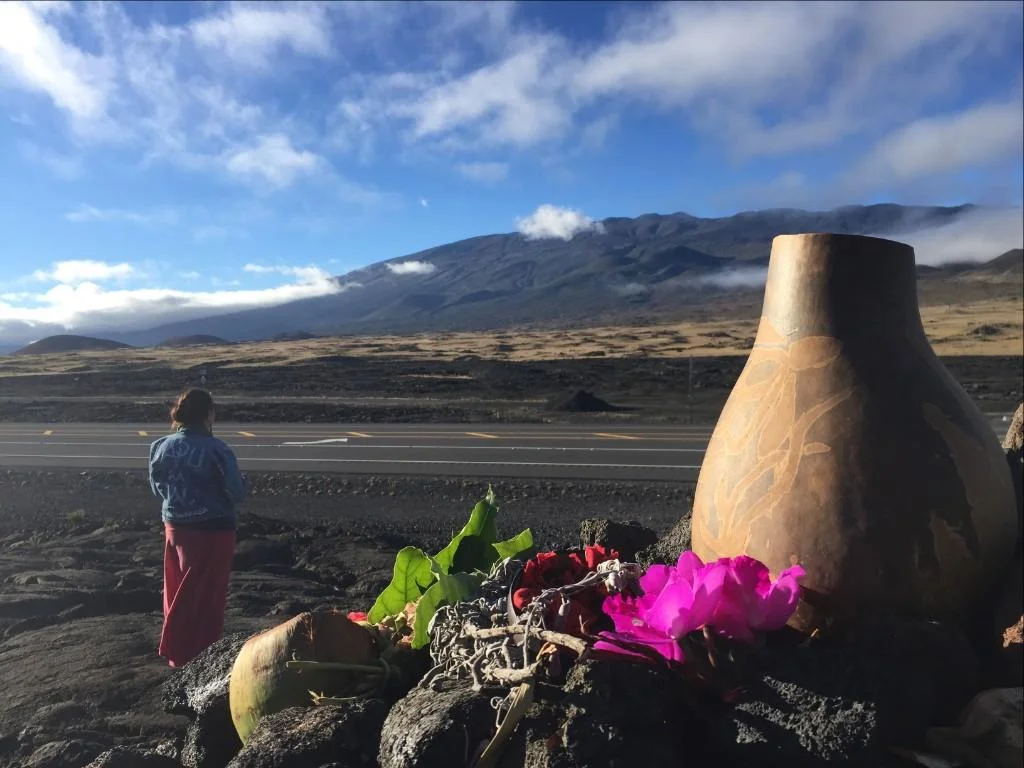
The area of Mauna Kea is under a state of emergency, as proclaimed by Hawai'i Governor David Ige on Wednesday, July 17, 2019, after a day of arrests and escalating tensions between law enforcement and the opponents of the planned Thirty Meter Telescope. Approximately 1,000 people have gathered at the intersection of the Daniel K. Inouye Highway (formerly known as Saddle Road) and the Mauna Kea Access Road to defend Mauna Kea mountain, which is considered sacred by Kanaka Maoli or Native Hawaiians. At least 34 people, including elders, have been arrested as of Thursday, July 18.
Since October of 2018, Mauna Kea is officially the development site for the TMT International Observatory Corporation’s Thirty Meter Telescope. Expected to stand 180 ft (54.9m) high with a diameter of 98 ft (30m) the Thirty Meter Telescope (TMT) has spurred heated contention from Native Hawaiians who believe the creation of the telescope encroaches on the vitality of the mountain, violates their land rights, will initiate environmental degradation, and severely dismisses Mauna Kea’s cultural and religious significance. Crucially, the free, prior and informed consent to construct the Thirty Meter Telescope, or any earlier telescope on traditional Native Hawaiian land was never asked for and never granted.
In an interview with Indigenous Rights Radio, Pua Case, a Native Hawaiian activist who grew up on Mauna Kea, explained the importance of the Native Hawaiian’s fight against the creation of the Thirty Meter Telescope. She revealed that the TMT will be built on “a mountain that can still shake. A mountain that still teaches and speaks to us. A mountain that we hold as a temple, as a sanctuary, as a sacred place. We stand because of that. We stand because don’t you think that at some point in time a native people and their supporters and their allies and their friends have the responsibility, the birthright, and the privilege to say no. Enough is enough. You have taken so much of what we already have that we are standing to say a’ole – no.”
In March 2019, Cultural Survival assisted a coalition of Native Hawaiian organizers to request Early Warning Measures and Urgent Action Procedures from the United Nations Committee on the Elimination of Racial Discrimination (CERD). The report submitted details “the discrimination that Native Hawaiians have faced from the State of Hawai’i and the United States of America” as well as the “persistent violations of multiple provisions of the International Convention on the Elimination of All Forms of Racial Discrimination.” Cultural Survival calls for the United States to take immediate action to end this ongoing discrimination in compliance with the declarations established under CERD and the United Nations Declaration on the Rights of Indigenous Peoples (UNDRIP). Since the recent threats of violence to protectors initiated last week, Cultural Survival also submitted an urgent update to the Committee on Monday, July 15.
Cultural Survival stands in solidarity with Mauna Kea protestors.
Call to Action:
- Call and Tweet Hawaii Governor David Y. Ige:
(808) 586-0034, @GovHawaii - Call Hawaii Attorney General Clare E. Connors Telephone:
(808) 586-1500 - Call your State governor and ask them to reach out to their colleagues in Hawaii. Find contact info here: https://www.usa.gov/state-governor
Demands:
- Respect the human rights of peaceful protectors on Mauna Kea. Avoid any use of violence and force on protestors and take steps to deescalate the situation.
- Declare a moratorium on construction for at least 60 days to allow for further dialogue and a legitimate process of Free, Prior and Informed Consent.
Stay up to date on hashtags #ProtectMaunaKea
Want more info?
Listen to our podcast episode “Stand Tall Like a Mountain” interviewing Mauna Kea protector Pua Case.



